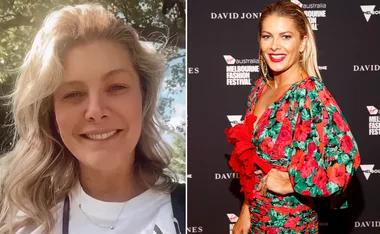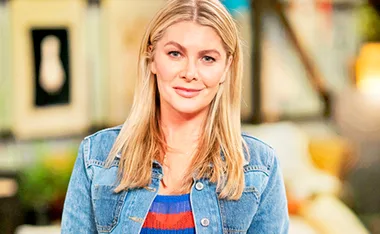Natalie Bassingthwaighte is perfectly suited to host her new series Space 22, in which a group of people struggling with mental health issues undertake art therapy.
Having been though a mental health crisis herself, the singer and actress tells Woman’s Day how she bonded with the participants and details how she managed to come out the other side of her “dark, scary and terrifying” experience.
Why did you want to be a part of Space 22?
Straight off the bat I was like, “I need to be involved.” I just felt really drawn to it. I feel like I’ve been through a lot myself and I’m ready to be vulnerable enough to share it. It’s not like I’ve hidden away from it before, but I think I was always fearful of sharing too much about it because of my career and stigma.
That doesn’t scare me as much anymore. I felt like I had a lot of information I could impart, but also you can always learn something new about how to help your own mental health journey.
It’s not as though the show is your story, but it is a part of it…It’s interesting because it wasn’t like that when they pitched it to me.

You always put on that happy smile and try to continue with your day.
(Image: Getty)The pitch was, “Do you want to host this show?” Throughout the course of doing a show like this where everyone is vulnerable, it’s kind of inevitable.
So, in some ways, you got as much out of this as the participants…I know! It was pretty cathartic. The first day I filmed, I rang my husband [Cameron McGlinchey] and said, “I think I found my purpose”, because I was just so moved at the process. I felt like everything I’d been through in my life had led to this moment. It feels so good to be on the other side and part of solutions.
You say on the show, “I feel like I’m playing 1000 characters.” Was one of those characters someone who is fine?
Of course! You always put on that happy smile and try to continue with your day.
Especially in our industry – you have to be on and you can’t go, “I don’t feel like it today.” I know people not in my industry who do the same thing – you put on a smile and walk out.
When you’re really struggling with mental health, it’s so hard and exhausting to pretend everything’s fine when you’re dying inside. What part does being a parent play – not wanting to admit you’re doing it tough because you have kids to look after?
I had a real turning point five years ago. I had a breakdown, and I was not there. I didn’t choose to not be there.
My body had literally shut down and it was awful. So looking back on it, I never want to do that again because my poor kids were like, “What’s wrong with Mum?” As a parent, I don’t want to shy away from talking about it.
I think it’s very OK to say, “I’m not OK. I’m not feeling great today or I’m really emotional,” and it’s like, “You’re allowed to feel emotional. Let’s talk about it.”

“I’m not OK. I’m not feeling great today or I’m really emotional.”
(Image: Instagram)How important was having your husband and kids Harper, 11, and Hendrix, nine, there for you?
Incredibly, because it can be very lonely when you’re in this space and very hard to understand. There are times when he’s like, “What’s wrong?” and I’m like, “I don’t know,” but to even stick around, it’s a big effort when it’s that hard. Honestly, I’ve been one of the lucky ones to have that support.

Nat with her family of four.
(Image: Instagram)What do you want viewers to take away from this show?
I want them to feel that they’re not alone. There are ways to get help. And I want loved ones to understand the people that are going through it more and what it feels like for them.
Space 22 Tuesday, 8pm, ABC & ABC iview.
.jpg?fit=900%2C553)

